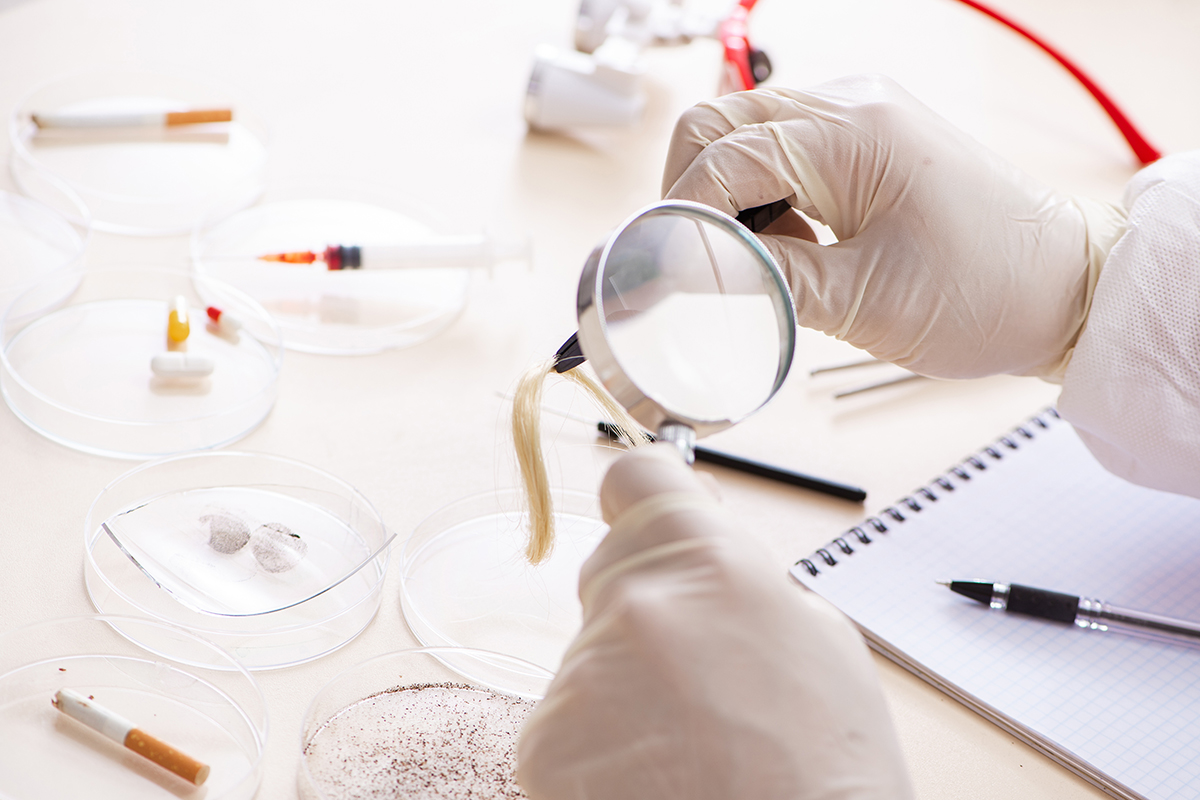When you’re up against criminal charges in Houston, sometimes, the evidence can feel overwhelming. This is especially true when the evidence might involve DNA. It’s a key factor in many cases for the prosecution and the defense.
DNA evidence has revolutionized the criminal justice system. It brings a scientific certainty to the courtroom that’s hard to refute. But what is DNA evidence? How does it work in criminal cases, particularly in sex crimes and murder cases?
Today, we’ll go over a few important aspects of DNA evidence in Texas criminal cases. However, if you need to speak with a defense attorney about a situation you or a family member are involved in, feel free to contact our law offices at any time.

Give us a call to schedule your free & confidential case review. You can reach Houston criminal defense attorneys Tad Nelson & Amber Spurlock 24/7 at 281-280-0100.
Understanding DNA Evidence

DNA, or deoxyribonucleic acid, is the genetic material that makes each person unique.
In criminal investigations, police can obtain DNA evidence from numerous sources like blood, hair, skin cells, saliva, and other bodily fluids.
DNA is like a genetic blueprint that can link a suspect to a crime scene with incredible accuracy.
When investigators find DNA at a crime scene, it undergoes a process of extraction, quantification, amplification, and analysis. This sequence ensures that even the smallest sample can be tested to provide a profile that matches a suspect.
DNA in Sex Crime Investigations
Sex crimes are often the most challenging cases to handle. For people charged with such crimes, the stakes are high. If convicted of a sex crime, the societal stigma is intense, and the criminal penalties are severe.
DNA evidence is usually a key element of sex crime cases.
For example, in rape or sexual assault cases, DNA can be collected from the victim’s body, clothing, or surroundings. This evidence can establish a physical connection between the victim and the suspect.
However, it’s not always straightforward.
The presence of DNA doesn’t automatically prove guilt.
Consensual contact, secondary transfer (where DNA is transferred indirectly), and contamination are factors that can complicate matters.
As experienced criminal defense lawyer-scientists, we know exactly how to scrutinize the collection, preservation, and testing of DNA evidence. During this process, we’ll know exactly what to look for to make sure it hasn’t been contaminated or mishandled in any way.
DNA in Murder Cases
In murder cases, DNA evidence is also a common factor.
Bloodstains, hair follicles, skin cells, and other biological materials found at the crime scene can tie a suspect to the murder.
However, just like in sex crime cases, the mere presence of DNA isn’t enough.
Forensic experts must establish the context in which the DNA was found. For instance, finding a suspect’s DNA at a crime scene they frequented isn’t necessarily incriminating. It’s the timeline and placement of the DNA that carry weight.
Challenging DNA Evidence
While DNA evidence is powerful, it’s not infallible. Errors can occur at any stage: collection, testing, interpretation, or reporting. Contamination is a significant risk. A crime scene is a chaotic environment, leading to the potential for DNA from various sources to easily get mixed.
Additionally, the Harris County Crime Lab here in Houston is not known for its competence in storing evidence. Cross-contamination between samples, mislabeling, or outright losing the evidence can lead to a dead end for prosecutors.
From a lawyer’s perspective, DNA doesn’t provide a complete picture. It doesn’t tell you how or when it was deposited. Defense attorneys must be vigilant in these types of cases. They must be proactive in examining every detail, from the chain of custody to the methods used in the lab, to protect their clients.
Texas Law & DNA Evidence
In Texas, DNA evidence is covered by the Texas Code of Criminal Procedure. It outlines specific procedures for the collection, preservation, and analysis of DNA samples.
Chapter 64 of the Code allows convicted individuals to request post-conviction DNA testing if it could potentially prove their innocence.
This has led to several exonerations.
The Sixth Amendment to the Constitution of the United States guarantees the right to confront one’s accuser. This right extends to challenging evidence. This means defendants have the right to cross-examine forensic experts in addition to questioning the validity of DNA evidence.
At The Law Offices of Tad Nelson & Associates, we take full advantage of these rights to fight for our clients’ freedom. If you have questions about a matter involving yourself or a family member, let our legal team look at your case. You might be surprised.
Defending Against DNA Evidence
As experienced criminal defense attorneys, we know firsthand that challenging DNA evidence requires a multifaceted approach. It’s about finding weaknesses in the prosecution’s case. These weaknesses can range from questioning the validity of the sample to exposing potential contamination or lab errors.
Our defense strategies against DNA evidence might include:
- Challenging the Collection Process: Was the DNA collected following proper procedures? Any deviation could render the evidence inadmissible.
- Examining the Chain of Custody: Every person who handled the evidence must be accounted for. Any gap in this chain can raise doubts about the evidence’s integrity.
- Questioning the Testing Methods: Different labs may use varying protocols. Understanding these can help in identifying potential errors or biases.
- Introducing Alternative Explanations: Just because DNA is present doesn’t mean it was involved in the crime. Exploring how the DNA could have been transferred or deposited is essential.
The Impact of DNA Evidence on Juries
DNA evidence often carries a perceived infallibility that can heavily influence juries. The so-called “CSI effect” leads jurors to place tremendous weight on DNA evidence. Unfortunately, this can sometimes occur at the expense of other critical factors. An effective defense attorney will work to demystify DNA evidence. This can help the jury understand DNA’s limitations and potential flaws.
Real-World Cases
Several high-profile cases illustrate the complexity of DNA evidence. In the case of Michael Morton, who was wrongfully convicted of his wife’s murder, DNA evidence not only exonerated him after 25 years in prison but also identified the real perpetrator.
This case underscores the dual power of DNA evidence in how it can convict or exonerate a defendant.
Another example is the infamous O.J. Simpson trial. DNA evidence was a focal point of the murder trial. Despite strong DNA links, the defense raised doubts about the integrity of the evidence. This ultimately led to Mr. Simpson’s acquittal.
Cases like these demonstrate that DNA, while compelling, is not an open-and-shut component of criminal cases.
The Future of DNA Evidence
Advancements in DNA technology continue.
Techniques like Next Generation Sequencing (NGS) offer more detailed genetic profiles. Such sequencing technology can be used to link individuals to specific ethnic backgrounds or familial lines potentially. However, these advancements also raise ethical and privacy concerns. Thus, the a need for careful legal considerations.
Need a Skilled Houston Criminal Lawyer on Your Side?
Contact Tad Nelson & Associates 24/7

If you’re being prosecuted for a crime in Greater Houston and DNA evidence is involved, you need a defense team that’s familiar with the science & skilled in legal strategy.
Houston criminal law Attorneys Tad Nelson & Amber Spurlock at Tad Nelson & Associates have extensive experience handling complex criminal cases involving DNA evidence. As a Board Certified® specialist in Criminal Law by the Texas Board of Legal Specialization™, Tad Nelson brings a wealth of skill to your defense.
Call us at 281-280-0100 to discuss your case and explore how we can help you challenge DNA evidence effectively. Schedule your free consultation with us today.
Your future may depend on it.




















